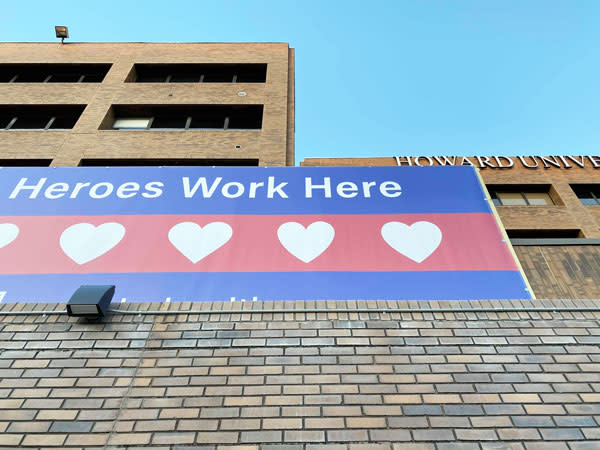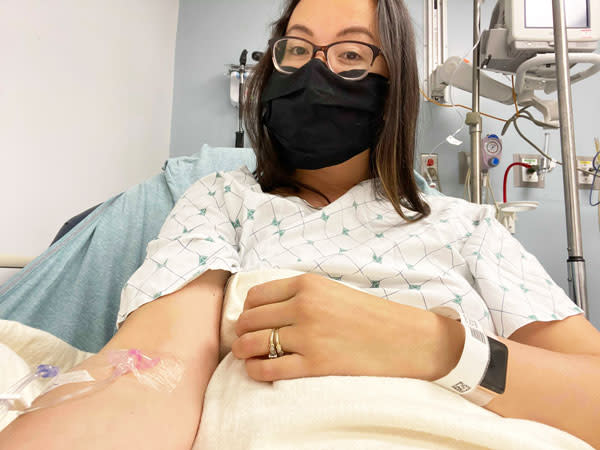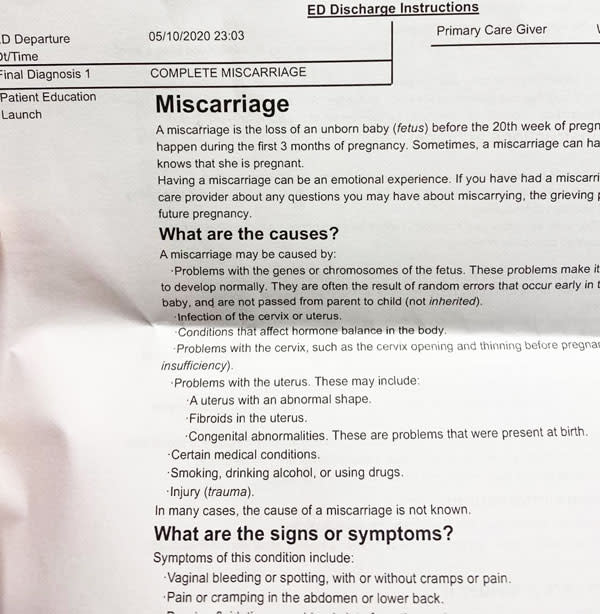I Had A Miscarriage On Mother’s Day––In The Middle Of A Pandemic
In medicine, we always look for the proof, the evidence to support our diagnoses and treatment plans. Sometimes the proof is as simple as gram positive cocci in clusters on a gram stain or a non-tender mobile mass on physical exam. In pregnancy, the proof is in the flicker of a tiny, healthy heart on a dating ultrasound or the outline of a profile during an anatomy scan. In the sound of a perfect, quick heartbeat on doppler or in growing weekly fundal height measurements. In the tiny flutters and hiccups that only mom can feel and the bigger kicks and movements that mom can share with others.
This time around, I didn’t have a chance to experience any of that proof. Since we were being intentional and hopeful about growing our family, I had diligently tracked my last menstrual period. As physicians, my husband and I were well-aware of the increased risks of pregnancy-related complications after a woman turns thirty-five, so we laughed at the irony that my estimated due date for this planned pregnancy fell on the day of my thirty-fifth birthday, a day we were arbitrarily aiming to complete our family by. Because we were sure of these dates and I was doing well, my doctor and I decided that telehealth was the best choice for our first prenatal visit, in this era of COVID-19 precautions. Our next visit together would be in a few days, when we hoped to hear the heartbeat for the first time.
But we never reached that visit. Instead, mid-morning on Mother’s Day, with each trip to the bathroom, I saw my pregnancy slipping away from me.
Things progressed and got worse throughout the day, and my doctor recommended that I go in to the emergency room, a place that I had been trying to avoid as much as possible during this pandemic. I had a Mother’s Day dinner with my husband and our daughters, and then around 8PM, I walked into my workplace. I usually take the back entrance from the physician parking structure and go straight to my clinic, but this time I entered through the emergency room entrance at the front of the hospital and saw, for the first time, the sign that read “Heroes Work Here.” They recently put that up as a reminder for our patients, our community, and maybe even for us as healthcare workers, that even during a pandemic, the work we do must go on.

A notice at registration displayed the hospital’s current no visitor policy due to COVID-19 precautions, reminding me that I’d have to do the next few hours alone. Inside, I quickly passed through triage and was moved to the GYN room in the corner of the emergency room. I was greeted soon after by my emergency medicine physician and when he walked in to the room we laughed at the role reversal, as a couple months earlier I had taken care of him as my patient. One of the special and strange things about working in a hospital is that sometimes your colleagues are your patients and sometimes they are your doctors, but usually, they are your friends.
He went over my history and quickly arranged for me to be taken to ultrasound to gather further information. The woman pushing me to the ultrasound room said softly as we rolled down the hall, “Happy Mother’s Day.” I wondered if she had seen the triage note in my emergency department chart that read “34-year-old G3P2 presents at 10 weeks pregnant…” Did she somehow know that I left my two kids at home to be here? Or was it because everyone that gets wheeled to this room is a mother (or mother-to-be)? Or maybe it was just because I was a woman on this day?
When we arrived, the ultrasound technician politely greeted me and told me what to do next. I laid there as she dimmed the lights and played soft music in the background. She went through the scans without saying a word, except the occasional, “a little pressure here.” One of the worst parts about being a doctor patient is that, besides knowing the potential worst-case scenario, you also know what you’d likely do in a given situation. You know that we try to give our patients hope, when possible.I came to the hospital already having convinced myself that I was having a miscarriage but during that scan, as impossible and irrational as it seemed, I found myself grasping for hope, waiting for the technician to turn to me and say, “There’s the baby. Do you wanna see the heartbeat?”

But those words never came, and I didn’t ask. I knew she would probably say, “The doctor will go over everything with you,” which would all but confirm what I already knew… there was no heartbeat there.
Back in my room, I waited. I was given a copy of my labs and the ultrasound report to review, perks of being a doctor patient, I suppose. The final read on the ultrasound report said: “No intrauterine gestational sac visualized. If the patient is pregnant, could represent a very early intrauterine gestation, fetal demise, or ectopic pregnancy. Recommend correlation with quantitation hCG levels.” The beta-hCG they were talking about was 4306 nm; all my other labs were normal. The obstetric-gynecologist arrived, completed her exam and finally told me what I had known for hours: complete miscarriage. Nothing to do now except to watch for any of the worrisome signs listed on my discharge papers.
“Nice to meet you, sorry we had to meet under these circumstances,” she said before departing.
I left the emergency room around 1AM. All of my pregnancies ended the day after a holiday. My eldest was born the day after Christmas, on her great-grandmother’s birthday. The oldest and youngest people in my family, for a little while, born on the same day. My second daughter was born the day after Labor Day, and here I was leaving the hospital the day after Mother’s Day, at the end of another pregnancy.
When I arrived home, everyone was already asleep. I showered and then climbed into bed, where my husband held me and I sobbed.
I woke up a few hours later and got ready for work. I had patients starting at 8AM back at the same hospital I had left from a few hours ago. I walked in through the usual back entrance remembering the sign at the front, “Heroes Work Here,” and heroes show up. Even during a pandemic, even after losing a pregnancy, the work we do must go on. I cried in my office with the door closed between patients… until I couldn’t. I couldn’t be a doctor on this day, so I cancelled my patients and went home, where I could cry with the door open.

As I curled up under a blanket on the couch, my five-year-old came up to me and asked why I was crying. On a typical day, she would be in school at this time, but school was online for the rest of the year, so we were all home together, as we had been for weeks. I told her we lost the baby and she sat down next to me, pulled me up onto her lap, cradled me in her arms, and told me, “Mom, I don’t think I’ve ever seen you cry. But you’ve seen me cry a hundred times. Remember, it’s okay to cry.”
Later that night, I was already in bed when it was time for the girls to go to sleep. My husband was getting ready to read them a bedtime story when my daughter hopped out of bed and ran over to our room. She came up to me and told me, “It’s gonna be okay, try not to cry about the baby too much tonight.” Then she tucked me in and kissed me on the forehead before heading back to her room.
On this day after Mother’s Day, when I wanted to feel like my body failed me at motherhood, my daughter’s small gestures reminded me that maybe I was succeeding after all. I did not expect to feel so undone by the loss of this pregnancy that I had no proof even existed. I experienced none of the proof of my previous pregnancies. No heartbeat heard, no baby bump seen, no kicks felt. I mourned the loss of someone I never met, something that I had nothing left to show for. I mourned the loss of the idea that this baby might complete our family, the loss of the chance to share a birthday with my child, the loss of possibility.
It’s hard to lose something that not many people even know you had. But I think it was that overwhelming grief, that hole where something once was, that is all the proof that I needed — your absence confirms your existence.
